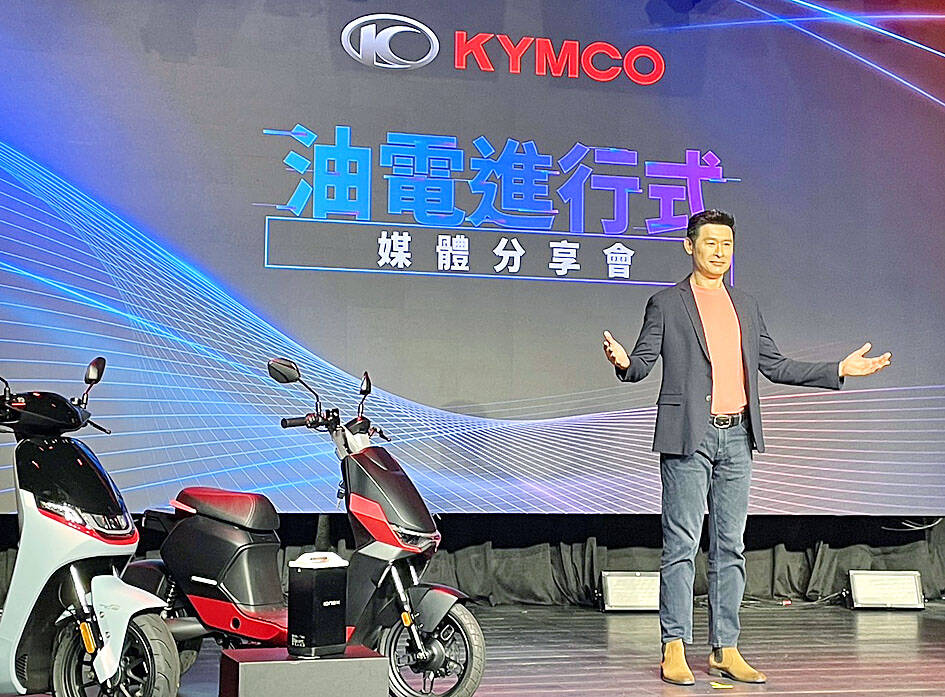Kwang Yang Motor Co (光陽工業), which sells electric scooters under the brand Ionex, said it is making strides to expand into Southeastern Asian markets with its first electric scooter in Thailand to be launched next week in Bangkok, about 13 months after forming a joint venture with PTT Public Co.
Thailand would serve as a base for the company to expand in Southeast Asia, with Indonesia the next destination, given its long-term partnership with ride-hailing company Grab, Kwang Yang said yesterday.
The Kaohsiung-based company is ready to take orders for its S7 electric scooter next week when it opens a flagship store in Bangkok, Kwang Yang chairman Allen Ko (柯勝?) told a news conference in Taipei.

Photo: CNA
The company plans to roll out two more models in the next six to 12 months, Ko said.
“We are not going to set a high sales target, as our priority is to build brand awareness and deliver good customer service,” Ko said. “As we are set to offer new models for the mass market, we are expecting to sell several thousand electric scooters next year.”
Kwang Yang has built 30 battery swap stations, mostly in Bangkok, through the joint venture and it expects to more than double that to about 70 next year, he said.
The firm is seeking collaborations with companies in Thailand to provide green energy, he said.
The company formed a three-way venture, Aionex Co, with PTT Public Co subsidiary Arun Plus Co and venture capital KYMCO Capital Private Equity Management Co (金庫資本) in August last year.
Arun has a 51 percent stake in the venture, while Kwang Yang and KYMCO Capital own 29 percent and 20 percent respectively.
Overseas expansion is essential for Kwang Yang as it seeks growth, particularly in Southeast Asia. The region boasts a sizeable market, with new scooter sales totaling 150 million units a year compared with about 800,000 units in Taiwan.
The company’s market share in Taiwan had risen to 22.2 percent as of Sept. 30 from 15.9 percent a year earlier, while market leader Gogoro Inc’s (睿能創意) share dropped to 67.4 percent from 69.7 percent in the same period.
A major shakeup in Gogoro’s board of directors after chairman and chief executive officer Horace Luke (陸學森) stepped down from his posts last month has prompted concern about the growth prospects of Taiwan’s electric scooter market.
However, Kwang Yang said it had not detected any adverse impact yet.
“It is normal to see ups and downs before a new technology prevails as the Internet and smartphones experienced,” Ko said.

Taiwan’s exports soared 56 percent year-on-year to an all-time high of US$64.05 billion last month, propelled by surging global demand for artificial intelligence (AI), high-performance computing and cloud service infrastructure, the Ministry of Finance said yesterday. Department of Statistics Director-General Beatrice Tsai (蔡美娜) called the figure an unexpected upside surprise, citing a wave of technology orders from overseas customers alongside the usual year-end shopping season for technology products. Growth is likely to remain strong this month, she said, projecting a 40 percent to 45 percent expansion on an annual basis. The outperformance could prompt the Directorate-General of Budget, Accounting and

Two Chinese chipmakers are attracting strong retail investor demand, buoyed by industry peer Moore Threads Technology Co’s (摩爾線程) stellar debut. The retail portion of MetaX Integrated Circuits (Shanghai) Co’s (上海沐曦) upcoming initial public offering (IPO) was 2,986 times oversubscribed on Friday, according to a filing. Meanwhile, Beijing Onmicro Electronics Co (北京昂瑞微), which makes radio frequency chips, was 2,899 times oversubscribed on Friday, its filing showed. The bids coincided with Moore Threads’ trading debut, which surged 425 percent on Friday after raising 8 billion yuan (US$1.13 billion) on bets that the company could emerge as a viable local competitor to Nvidia

BARRIERS: Gudeng’s chairman said it was unlikely that the US could replicate Taiwan’s science parks in Arizona, given its strict immigration policies and cultural differences Gudeng Precision Industrial Co (家登), which supplies wafer pods to the world’s major semiconductor firms, yesterday said it is in no rush to set up production in the US due to high costs. The company supplies its customers through a warehouse in Arizona jointly operated by TSS Holdings Ltd (德鑫控股), a joint holding of Gudeng and 17 Taiwanese firms in the semiconductor supply chain, including specialty plastic compounds producer Nytex Composites Co (耐特) and automated material handling system supplier Symtek Automation Asia Co (迅得). While the company has long been exploring the feasibility of setting up production in the US to address

OPTION: Uber said it could provide higher pay for batch trips, if incentives for batching is not removed entirely, as the latter would force it to pass on the costs to consumers Uber Technologies Inc yesterday warned that proposed restrictions on batching orders and minimum wages could prompt a NT$20 delivery fee increase in Taiwan, as lower efficiency would drive up costs. Uber CEO Dara Khosrowshahi made the remarks yesterday during his visit to Taiwan. He is on a multileg trip to the region, which includes stops in South Korea and Japan. His visit coincided the release last month of the Ministry of Labor’s draft bill on the delivery sector, which aims to safeguard delivery workers’ rights and improve their welfare. The ministry set the minimum pay for local food delivery drivers at